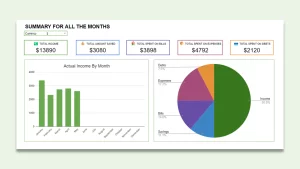
What are the biggest personal finance mistakes young professionals make?
As a young professional, stepping into the world of finance can be both exciting and daunting.
While earning your own income brings a sense of independence, it also comes with a set of financial responsibilities that may be new to you.
In navigating this journey, it’s crucial to be aware of common pitfalls that many young professionals encounter when managing their finances.
Here, we’ll discuss some of the biggest personal finance mistakes and how to avoid them:
LIVING PAYCHECK TO PAYCHECK
It’s tempting to spend everything you earn, especially with the allure of a newfound income. However, this approach leaves no room for saving or unexpected expenses.
The solution is to create a budget that tracks your income and expenses. Allocate funds for essentials like rent, food, and utilities, leaving room for savings and responsible spending on non-essentials.
You can also use an app like Codlixe to track and understand what is going on with your finances
NOT HAVING A BUDGET
As pointed out above, one of the most common mistakes young professionals make is not creating and sticking to a budget.
Without a budget, it’s easy to overspend and lose track of where your money is going. Take the time to establish a budget that outlines your monthly income and expenses.
Be sure to allocate funds for essentials such as rent, utilities, groceries, and savings, and also leave room for discretionary spending.
I made a free spreadsheet that you can use for budgeting. You can get it here.
LIFESTYLE INFLATION
As your income increases, it’s easy to fall into the trap of increasing your spending habits. This can quickly erode your savings and financial progress.
The solution is to practice mindful spending. Differentiate between needs and wants, and avoid impulsive purchases.
With the newfound freedom of earning a salary, many young professionals fall into the trap of living beyond their means.
This often involves spending excessively on non-essential items like dining out, designer clothes, or expensive gadgets.
While it’s okay to treat yourself occasionally, prioritizing needs over wants is essential for long-term financial stability.
Remember, financial freedom is built on smart spending, saving habits, and responsible investing.
LACK OF FINANCIAL LITERACY
Knowledge is power, especially in the realm of personal finance. Many young professionals lack the basic understanding of financial concepts, making them vulnerable to poor decisions.
Make sure to educate yourself! Numerous resources are available online, through libraries, and even financial workshops offered by employers.
The more you learn, the more empowered you’ll be to make informed financial choices. Codlixe can help you gain insights into your finances.
FAILING TO INVEST FOR THE FUTURE
Retirement may seem like a distant concern, but the power of compound interest is immense. Starting early allows your money to grow exponentially over time.
Start investing early, even if it’s a small amount, this will allow for a long time of compounding, take advantage of the power of compounding.
Even a small contribution towards your retirement savings can make a significant difference in the long run.
DROWNING IN DEBT
Student loans, car payments, credit card debt – it can feel overwhelming. Ignoring debt or making minimum payments only allows the burden to snowball.
The solution is to develop a debt repayment strategy. Prioritize high-interest debts and explore options like consolidation or refinancing to lower interest rates.
Take the time to understand your loan terms, explore repayment options, and consider refinancing if it makes financial sense.
Making consistent payments, even if they’re small, can help you chip away at the debt over time.
In conclusion, navigating personal finances as a young professional can be challenging, but avoiding common mistakes can set you on the path to financial success.
By creating a budget, living within your means, addressing debts, building an emergency fund, investing for the future, and seeking financial education, you can take control of your financial future and build a solid foundation for long-term prosperity.
Remember, the key is to start early, stay disciplined, and make informed decisions that align with your financial goals.


